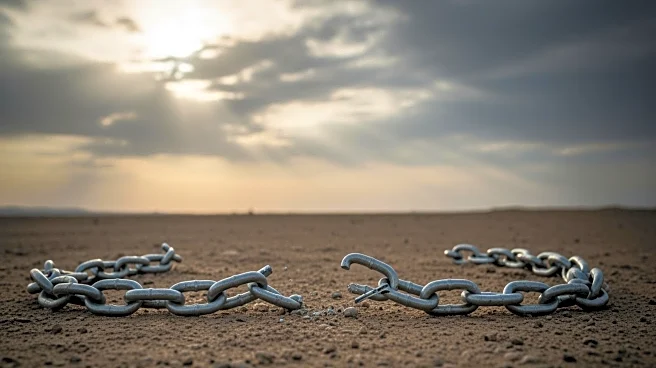What's Happening?
Hamas has announced that it will return the remains of a deceased hostage held in Gaza to Israel. This development comes amid a ceasefire between Israel and Hamas, which has seen a temporary halt in hostilities.
The announcement was made by Hamas's armed wing, which stated that the remains had been located. The return is scheduled for 8:00 pm, with the process involving Red Cross vehicles escorting a truck transporting the bodies of Palestinians who had been held in Israel during the conflict. This exchange is part of ongoing efforts to manage the humanitarian aspects of the conflict, which has seen significant casualties and displacement.
Why It's Important?
The return of the remains is a significant humanitarian gesture that could influence the fragile ceasefire between Israel and Hamas. Such actions are crucial in building trust and potentially paving the way for more comprehensive peace talks. The involvement of the Red Cross highlights the international community's role in mediating and facilitating humanitarian exchanges in conflict zones. For Israel, the return of the remains is a sensitive issue, impacting public sentiment and political dynamics. For Hamas, it represents a strategic move to maintain its standing and negotiate from a position of relative strength. The broader implications could affect regional stability and international diplomatic efforts.
What's Next?
The next steps will likely involve further negotiations between Israel and Hamas, potentially leading to more exchanges or discussions on broader ceasefire terms. The international community, particularly organizations like the Red Cross, may continue to play a mediating role. Political leaders in Israel and representatives of Hamas will need to navigate public opinion and internal pressures while considering the humanitarian and strategic aspects of the conflict. The outcome of these negotiations could influence future peace efforts and the stability of the region.
Beyond the Headlines
This development underscores the complex interplay of humanitarian concerns and political strategy in conflict zones. The return of remains is not just a humanitarian act but also a political statement, reflecting the ongoing struggle for power and legitimacy. It highlights the challenges of achieving lasting peace in a region marked by deep-seated animosities and historical grievances. The role of international organizations in facilitating such exchanges also points to the importance of global cooperation in addressing humanitarian crises.










